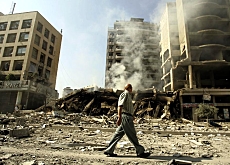ICRC receives pledges from Israel on access

The president of the International Committee of the Red Cross says he has received pledges from Israel to gain better access for the ICRC in southern Lebanon.
Jakob Kellenberger was commenting after talks on Thursday with the Israeli prime minister, Ehud Olmert.
Kellenberger, who has ended a four-day visit to southern Lebanon and Israel, had insisted that improved access was essential given the desperate humanitarian situation.
In a statement from the ICRC’s Geneva headquarters, Kellenberger noted that Olmert had given him “personal commitments” that everything possible would be done to ease access for ICRC teams on the ground.
“I note that some steps have already been taken today and I intend to closely monitor this key issue.”
Kellenberger told a news conference in Jerusalem that Olmert had promised to help in the evacuation of between 400 and 600 people, mainly children and injured, from southern Lebanon and to allow a ship with food and medicines to enter the port of Tyre.
During his visit, Kellenberger pressed the warring parties to spare civilian lives and infrastructure, as well as pay more respect to the rules of war as enshrined in international humanitarian law.
Plight of civilians
Kellenberger saw firsthand the plight of civilians in the region after travelling by road from the Lebanese capital, Beirut, to Tyre in the south of the country, and later from Tyre into northern Israel.
“The distinction between civilians and civilian property, on the one hand, and military targets on the other is fundamental.”
“Once again, civilians are paying the price of conflict. There is little consideration given to their protection – protection they are entitled to under international humanitarian law,” he commented.
In his talks with Israeli authorities, Kellenberger said he was “extremely concerned” about the insufficient access for the ICRC and the Lebanese Red Cross to areas most affected by the fighting.
The ICRC said it had been able to return to those areas only sporadically and always under “incredibly difficult” security conditions.
“Even life-saving emergency evacuations so desperately needed are, at best, delayed for days. We also face enormous obstacles to bring in aid convoys loaded with essential foodstuffs, water and medicines for trapped civilians,” Kellenberger noted.
Disgrace
In a related development, the United Nations emergency relief coordinator, Jan Egeland, criticised both Israel and Hezbollah on Thursday, saying it was a “disgrace” that they would not stop fighting long enough to allow aid deliveries to desperate civilians.
He told a news conference in Geneva that a ceasefire in the five-week conflict would pave the way for a major aid operation for the “besieged populations of southern Lebanon” where he said 120,000 civilians were in need of aid.
“I don’t think any military advantage has been gained in these last days or will be gained in the next few hours but we could save a lot of lives,” he said.
On Friday, the new UN Human Rights Council is due to meet in Geneva at the request of Muslim states to discuss the conflict.
A letter calling for the session presented by Tunisia on behalf of 16 nations said the 47-member body, which includes Switzerland, should take action “on the gross human rights violations by Israel in Lebanon”.
Launched in June to replace the widely criticised human rights commission, the council has no enforcement powers. It aims to exert moral pressure on countries it deems to be violating UN accords.
Neither Israel nor the United States has a seat in the council.
swissinfo with agencies
The ICRC has a permanent mandate under international law to take impartial action for prisoners, the wounded and sick, and civilians affected by conflict.
As a sign of the gravity of the conflict, the ICRC has launched an appeal for €65 million (SFr102.68 million).
The ICRC, which has been in the country since 1967, says it has sharply stepped up its humanitarian response since the beginning of the conflict (from six to 59 delegates)
It notes that working in close cooperation with the Lebanese Red Cross it has mobilised all the means at its disposal to tackle the urgent needs of the crisis.
But in southern Lebanon the ICRC has managed to complete only a fraction of its planned activities.
ICRC president Kellenberger describes this as a concrete illustration of the real difficulties the organisation faces on the ground.

In compliance with the JTI standards
More: SWI swissinfo.ch certified by the Journalism Trust Initiative











You can find an overview of ongoing debates with our journalists here . Please join us!
If you want to start a conversation about a topic raised in this article or want to report factual errors, email us at english@swissinfo.ch.